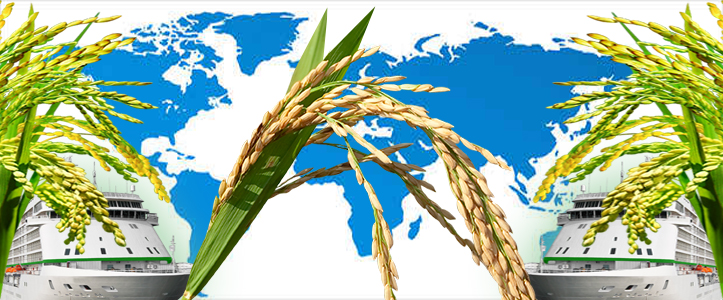|
Rice
Loss of international rice
market

It is somewhat odd to highlight the
dwindling exports of the country and moan about their trend when
the government is bent upon taking credit for the increase in
foreign exchange reserves and stability in the exchange rate
without a proper analysis of the factors behind such positive
developments.
However, some exporters, of late, seem to be voicing their
concerns about the prevailing unsatisfactory conditions.
President, Pakistan Businessmen and Intellectuals Forum (PBIF),
Mian Zahid Hussain, for instance, has demanded of the government
to bail out the sinking rice sector otherwise the country may
lose export market to India.
Pakistan exports rice, worth over two billion dollars per annum,
but has been losing the export market for the last two years,
landing over one thousand rice mills into serious problems and
risking millions of jobs in this critical sector.
Highlighting problems of rice growers and rice mills in the
country, President, Pakistan Rice Mills Association, Mukhtar
Baloch also reiterated that the situation is turning against
Pakistan and in favour of India which has introduced its own
brands.
He
revealed that 3,000 rice mills are facing problems and more than
1000 mills are on the verge of collapse that have failed to sell
rice during the past two years. 0.35 million of rice bags are
lying unsold in only one district and mills are unable to repay
loans, adding to increased interest on past loans.
During the current Kharif season, farmers are reluctant to sow
rice as they are not getting a fair price of their produce which
would put the future of rice industry and agriculture sector at
stake.
The observations of traders associated with rice exports would
seem to be a very fair commentary on the current market
conditions of an important export item of the country which has
the potential to raise the value of overall exports
significantly and contribute a lot to the expansion of economic
activity and job creation.
However, most of the recent developments indicate very clearly
that Pakistan has failed to avail the opportunity and missed the
chances of expanding rice exports for one reason or the other.
Rice accounted for 11.3 percent of the total exports of the
country in 2009-10 but its share fell to only 7.6 percent by
FY14.
The situation in FY15 is also not likely to be much different
due mainly to a negative price effect in the international
market. In fact, overall exports of the country are also
performing very poorly this year.
Value of exports were targeted to grow by 5.8 percent to reach
dollar 27.0 billion during 2014-15 due mainly to the grant of
GSP Plus status, a likely improvement in the energy supplies and
an increase in trade with regional partners.
However, exports have already declined by as much as 5.0 percent
during July-April, 2015 compared to the corresponding period
last year and such a dismal trend should give sleepless nights
to policymakers of the country who still remain unfazed about
the emerging situation.
The report of trading charges between the Finance Minister and
the Minister of Water and Power in this newspaper on 8th June,
2015 over the impact of energy supplies on the industrial sector
in a meeting chaired by the Prime Minister is of course
unfortunate.
The entire government machinery, in our view, should jointly
devote its energies towards enhancing energy supplies, spurring
industrial growth and accelerating exports so that the country
could generate its own resources to pay for the imports and
eliminate its dependence on the IMF.
However, while the exporters are right in asking the government
to re-evaluate its export policy framework, the businesspeople
are also required to improve their performance to compete in a
highly complex international market.
Of
course, energy supplies and law and order situation have to be
improved, a conducive taxation and customs regime has to be
provided and overvaluation of the Pak rupee should be corrected
but there is no reason for exporters to be complacent about the
developments in the world markets and always look to the
government for support.
It
is hard to understand, for instance, why Pakistani exporters
cannot compete effectively and have an edge over Indian
exporters, when Pakistani rice and mangoes are rated relatively
superior in quality in the international market.
Latest market technologies and imaginative ways could make a
difference in attracting foreign buyers and raising the sales of
exportable items.
A
decline in exports this year is such a bad news that all the
relative stakeholders need to ponder over this unfortunate
development at the earliest.
June 2015
By BRecorder
Report
Source: Business
Recorder
|